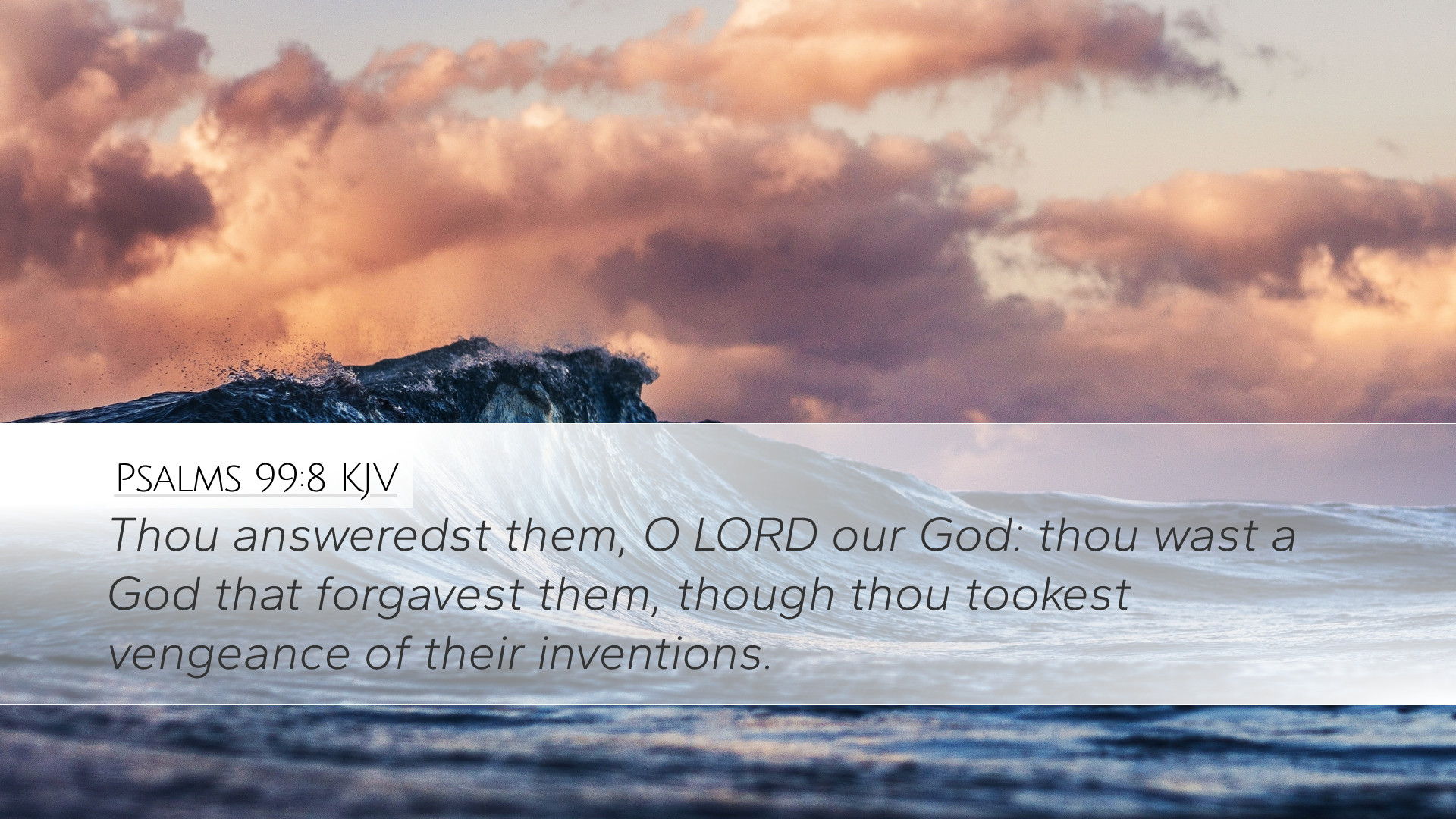Commentary on Psalms 99:8
Psalms 99:8: "O Lord our God, Thou wast a God that forgavest them; though Thou tookest vengeance of their inventions."
Introduction
This verse from Psalms encapsulates the duality of God's character as both a forgiving and just deity. It serves as a reminder of His mercy juxtaposed against His righteousness. Esteemed theologians like Matthew Henry, Albert Barnes, and Adam Clarke have provided profound insights into the implications of God's forgiveness and the necessity of His justice.
Exegesis and Analysis
Contextual Background
The context of Psalm 99 is framed within Israelite worship, where the majesty of God is celebrated alongside reminders of their past transgressions and His subsequent forgiveness. As a psalm of enthronement, it emphasizes God's sovereignty and His active involvement in history, particularly regarding Israel.
Divine Forgiveness
Matthew Henry notes that God’s willingness to forgive is central to understanding His nature. He suggests that this forgiveness is not an indulgence of sin but rather a divine act that occurs after acknowledgment and repentance. The psalmist acknowledges that despite Israel's repeated rebellions, God remains steadfast in His commitment to pardon those who seek Him.
Understanding Vengeance
Albert Barnes expounds on the idea of “vengeance” in this verse, which he interprets as a necessary act of justice in response to human iniquities. God's vengeance, therefore, is not arbitrary; it is an appropriate response to the “inventions” or sins of humanity. This dual portrayal emphasizes that while God forgives, He does not overlook the gravity of transgressions.
The Nature of God’s Justice
Adam Clarke highlights that God’s justice serves to uphold His holiness. The tension between forgiveness and justice is reconciled in the life of Christ, where ultimate justice meets perfect mercy. Clarke emphasizes that this verse reminds believers of the serious nature of sin and the unshakeable character of divine justice that must be both acknowledged and respected.
Theological Implications
The Balance of Justice and Mercy
This verse, particularly its acknowledgment of both God’s forgiving nature and His justice, serves a vital theological function. It reminds pastors and theologians of the essential character of God that must inform their preaching and teaching. In recognizing God’s mercy, there lies a challenge to address sin appropriately, emphasizing repentance, and the need for humility before God.
Implications for Worship
The dialectic of forgiveness and justice also shapes Christian worship. As highlighted by Henry, the acknowledgment of our sins should lead believers into deeper worship, wherein the greatness of God’s mercy inspires gratitude and reverence. A balanced understanding of these attributes fosters a worship environment that honors both the holiness and the love of God.
Practical Applications
-
Encouragement for Repentance:
This verse serves as a call to repentance. Church leaders are encouraged to foster an atmosphere where confession and repentance are seen as paths to experiencing God’s forgiveness.
-
Upholding God’s Holiness:
In teaching, it is vital to convey that while God's forgiveness is graciously abundant, His holiness necessitates justice. This duality should be central in doctrinal teaching and sermon preparation.
-
Fostering Gratitude:
Believers should cultivate a heart of gratitude for the forgiveness they have received, understanding that it comes at the cost of Christ’s sacrifice, the perfect atonement for sin.
Conclusion
Psalms 99:8 encapsulates profound truths about the character of God, interweaving themes of forgiveness and justice. By studying this verse, we are reminded of the importance of recognizing our sins, the grace available through repentance, and the necessity of honoring God’s justice in our lives and ministries. Both the historical context and theological reflections illuminate our path toward a deeper understanding of who God is, urging us to interact with His power and grace reverently and thoughtfully.


